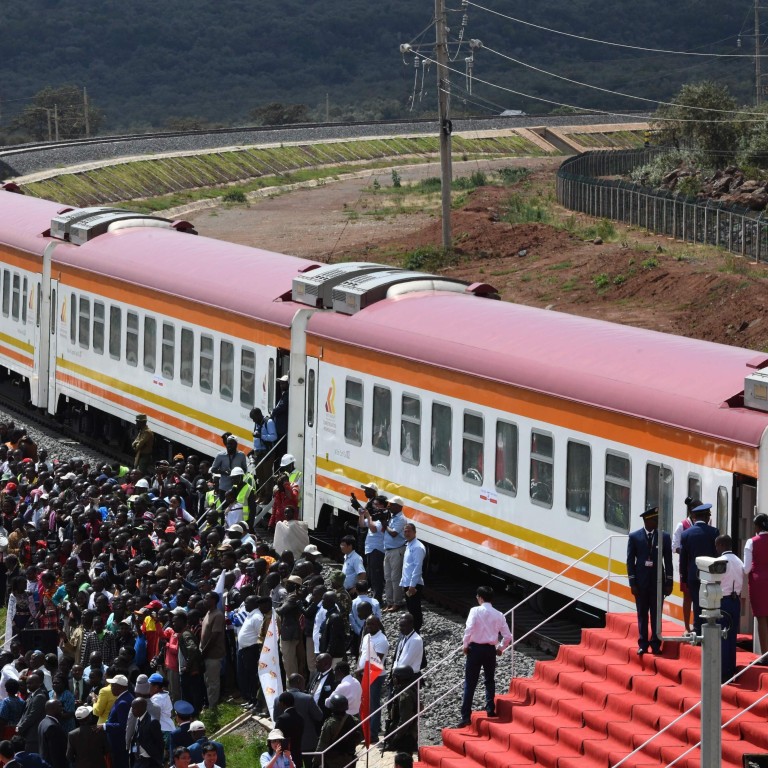
Contract for Kenya’s China-funded railway ruled ‘illegal’
- Court of Appeal finds against US$3.2 billion contract for belt and road project which started operating in 2017
- Ruling throws question mark over future of this and other construction agreements
Xi congratulated Kenya’s President Uhuru Kenyatta for ensuring the uninterrupted flow of cargo from the Port of Mombasa on the Kenyan coast into the East African hinterland via the Standard Gauge Railway (SGR), which first started operating in 2017. Kenya’s decision, he said, had helped keep trade flowing in the region despite freight restrictions required by Covid-19 containment measures.
But the rail project has faced one setback after another, and the latest could have major implications on its future and any other projects that may follow. On Friday, a Kenyan appellate court declared the rail contract between Kenya and the China Road and Bridge Corporation (CRBC) illegal.
The Court of Appeal, which handles cases arising from the decisions of the High Court in Kenya, ruled that state-owned Kenya Railways had failed to comply with – and violated – the nation’s laws “in the procurement of the SGR project”.

02:09
Kenya opens massive US$1.5 billion railway project funded and built by China
Kenyan activist Okiya Omtatah and the Law Society of Kenya, an association of practising advocates, brought the suit in 2014 in a bid to stop construction of the SGR. They argued the railway was a public project that should have been subject to a fair, competitive and transparent procurement process.
Instead, they said, the contract was single-sourced without being put up for tender, despite the burden of loan repayments falling on Kenyan taxpayers.
The High Court dismissed the case and ordered that documents used by the plaintiffs to support their case – including the contract and other negotiation documents, which the government said were classified – had been obtained illegally and were to be expunged from court records. Aggrieved by the decision, the plaintiffs appealed.
Kenya Railways and CRBC defended the contract, saying the Kenyan government had negotiated a financing agreement with Exim Bank of China for two loans, each for US$1.6 billion, to support the SGR project.
China to forgive interest-free loans to Africa that are coming due, Xi says
But the appeal court’s decision in favour of the plaintiffs comes after a large section of the project has been completed and is operational. While it is unclear what might happen next, it is possible either the Kenyan government or CRBC could take a challenge of the appeal court ruling, or seek its interpretation, in the Supreme Court.
However, legal experts said that Friday’s ruling may also have future implications as it gives leeway for both the government and the CRBC to avoid meeting contractual obligations.
Nelson Havi, president of the law society, suggested the Court of Appeal ruling may provide an excuse for the Kenyan government to dismiss its liability over the project if it wanted to. “It may be a preparatory process for GoK [Government of Kenya] to plead illegality at an international arbitration should China Road and Bridge Corporation sue for breach of contract,” Havi posted on Twitter.
Gad Ouma, a commercial lawyer and managing partner at Nairobi-based law firm G.M. Gamma Advocates, described the ruling as one which the government could use as grounds to find its way out of its obligations in the contract – but that it would not be easy.
For a completed project, Ouma said, if there was any dispute, the government would likely to be found liable to discharge its obligations under the contract. “It would be very hard at this point for the government to come out of the contract to say it is not liable.”
Railway to nowhere? Kenya launches cargo services on China-funded line
CRBC would have a case regarding the legality of the appellate court ruling, he pointed out. “Where a party is likely to steal a march through the back door, the courts or any international arbitration body is likely to protect the weak party,” Ouma said, adding that such contracts always have applicable laws or dispute resolution mechanisms.
CRBC was awarded the US$3.2 billion contract in 2014 to build the rail line running from the port of Mombasa to Kenya’s capital city, Nairobi. Its parent company, the China Communications Construction Company, later stepped in to build an extension from Nairobi to Naivasha, a town in the Central Rift Valley, for another US$1.5 billion.
Both projects have been completed, with passenger and cargo trains operating, and in 2017 the Africa Star Railway Operation Company, a CRBC subsidiary, was awarded the contract to manage the operations of both passenger and cargo trains on the SGR.
Kenya planned to extend the railway to Malaba, on its western border with Uganda, but China’s Exim Bank, which financed the first two phases, asked Kenya to redo a feasibility study for the Malaba extension to prove its commercial viability before funds were released.
“China Exim Bank is currently carrying out a feasibility study on the construction of the railway extending westwards,” the Chinese embassy in Nairobi said.
Under pressure to pay its debts amid the coronavirus pandemic, which has ravaged the economy, the Kenyan government has been forcing importers to use the train. But truckers and importers have resisted, saying it is more costly to use the rail than trucks.
Last year, SGR made US$136 million in revenues from cargo and passenger services. But this month, Kenya’s parliament disclosed that Kenya Railways had not paid US$380 million in management fees to Africa Star Railway. The Chinese embassy in Nairobi confirmed that Africa Star Railway had not been paid part of the fees but “appreciated the efforts that the Kenya government has made to clear the pending payments”.

